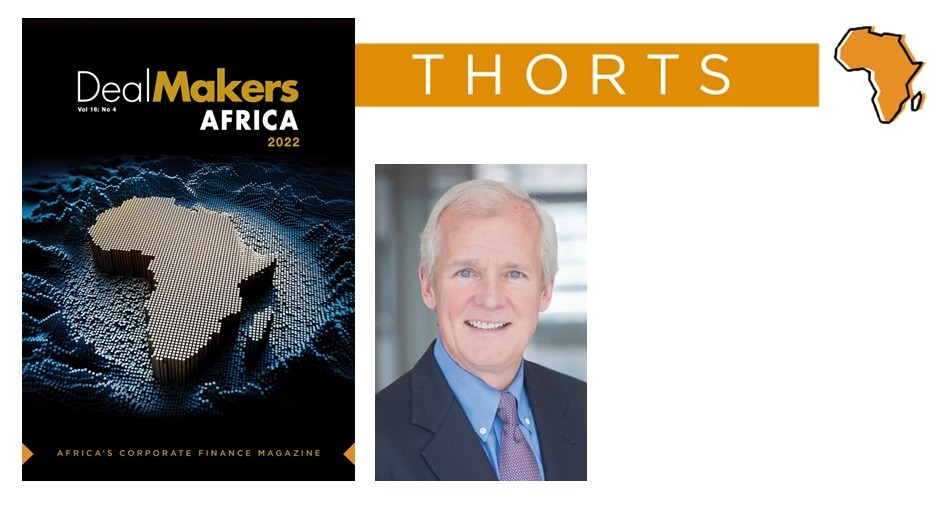The United States (US) and countries in Africa are building strong partnerships that boost sustainability, empower local communities with a focus on opportunities for women and youth, and provide benefits for both African and US citizens. Recently, the US has made numerous announcements regarding cementing its strong ties with Africa via, for example, increased climate financing, infrastructure development support, food security initiatives, development of new innovation and technology, strengthening of healthcare systems, and reciprocal trade and investment initiatives.
At the US-Africa Leaders’ Summit in December 2022, a memorandum of understanding (MoU) was signed between the US Trade Representative and the African Continental Free Trade Area (AfCFTA) Secretariat to expand engagement and “promote equitable, sustainable, and inclusive trade; boost competitiveness; and attract investment to the continent.” It was also announced that the US intended to invest US$55 billion in Africa over the next three years, and that $15 billion would be deployed in “two-way trade and investment commitments, deals, and partnerships that advance key priorities, including sustainable energy, health systems, agribusiness, digital connectivity, infrastructure, and finance.”
In August 2022, a fact sheet issued by the White House noted that sub-Saharan Africa (SSA) played “a critical role in advancing global priorities to the benefit of Africans and Americans. It has one of the world’s fastest growing populations, largest free trade areas, most diverse ecosystems, and one of the largest regional voting groups in the United Nations. It is impossible to meet today’s defining challenges without African contributions and leadership.”
The White House further noted that its Africa strategy articulated the new US vision for a 21st century US-African Partnership and the “tremendous, positive opportunities that exist to advance shared interests alongside our African partners.”
CLIMATE FINANCE
Developing countries are among the most vulnerable in the world to the effects of climate change, especially with regard to adapting to weather extremes and finding solutions that address food insecurity and energy and water scarcity. The availability of climate financing to assist developing countries with the transition to a low-carbon, climate-resilient future was one of the key topics under discussion at last November’s United Nations Climate Change Conference (COP 27) in Egypt.
In a speech at COP 27, US President Joe Biden said that the US Emergency Plan for Adaptation and Resilience Fund (PREPARE) had already deployed $2 billion in financing to help developing countries prepare for climate change. He announced a $150 million down payment to support PREPARE’s adaptation efforts in Africa, including for the Accelerating Adaptation in Africa project that was launched by the US and Egypt earlier in 2022. Other US climate initiatives in Africa include expanding access to early warning systems, building capacity for African decision makers to accelerate climate adaptation, supporting locally led adaptation efforts, expanding access to risk-based insurance for the most vulnerable, mobilising private sector support, and supporting climate-smart food systems, as well as the ‘Advancing Climate Security Through Sahel-Climate Advocacy and Peacebuilding with Pastoralists’ initiative.
POWER AFRICA
Power Africa – a US government-led programme that focuses on addressing Africa’s access to electrical power – has provided significant support to African countries since its launch in 2013.
A US Agency for International Development (USAID) report shows that, since then, Power Africa has helped to bring more than 5,500 megawatts (MW) of cleaner and more reliable power generation and first-time electricity to 127,7 million people across sub-Saharan Africa. A White House fact sheet detailed how Power Africa had helped to close 145 power generation investments with a value of $24 billion. The programme is a partnership between the US government and the governments of Ethiopia, Ghana, Kenya, Liberia, Nigeria, Tanzania, and the private sector.
At the Summit, the launch of the Clean Tech Energy Network was announced as part of the Power Africa initiative. This is a collaboration between the US Government, US clean tech energy companies, and African energy stakeholders. Around $350 million is expected to be mobilised via this initiative. Further, it was announced that a $150 million public/private partnership has been operationalised to provide clean power to 10,000 health care facilities in SSA.
INFRASTRUCTURE FINANCE
At the G7 Summit in June 2022, it was announced that a $600 billion lending initiative, the Partnership for Global Infrastructure and Investment (PGII), would be launched to fund infrastructure projects in the developing world, with a particular focus on Africa. The G7 countries – Canada, France, Germany, Italy, Japan, the UK, and the US – explained that the PGII would help address the infrastructure gap in developing countries, with a core focus on sustainability.
At the same time, the US announced that as part of the PGII, it would mobilise $200 billion for developing countries over the next five years. This funding will be in the form of grants, financing and private sector investments. One of the priority pillars of this funding will be “tackling the climate crisis and bolstering global energy security through investments in climate resilient infrastructure, transformational energy technologies and developing clean energy supply chains across the full integrated lifecycle.” Some deals have already been announced, including a $2 billion solar energy project in Angola, and the building of multiple hospitals in Côte d’Ivoire.
TRADE AND INVESTMENT
In July 2021, the Biden Administration announced that it would renew the US Prosper Africa initiative, started in 2019, with a focus on increasing reciprocal trade and investment between the US and African countries. At the time, the US said that the initiative would focus on improving trade and investment in sectors such as infrastructure, energy and climate solutions, healthcare and technology. Seventeen US government agencies working as part of this initiative were given a mandate to, among other things, empower African businesses, offer deal support, and connect investors from the US with those in Africa.
Also noted at the renewed Prosper Africa launch was the intention to focus on projects that supported women, and small and medium enterprises in Africa. Under the Biden Administration, US engagement with African countries has focused on strengthening these trade and investment relationships in a strategic, cooperative and reciprocal way, with a vision of shared prosperity between Africa and the US.
At the Summit, Prosper Africa announced plans to boost African exports to the United States by $1 billion through investments and partnerships, and to mobilise an additional $1 billion in US investment in Africa.
TRADE
The US has often expressed its support for AfCFTA, the Africa-wide free trade zone, stating that it wants to see the growth of Africa’s economic power in the world. All future trade agreements signed between the US and African countries will have to align with AfCFTA’s trade stipulations and, considering the Biden Administration’s environmental stance, new agreements will likely also include climate change provisions and tariffs on high-carbon imports.
The Administration is also focusing on trade agreements that don’t disadvantage US businesses and consumers. For example, the US-Kenya Strategic Trade and Investment Partnership (STIP) was signed in July 2022. The agreement outlined the enhanced engagement and high standard of commitment between the two countries, and focused on increased investment and sustainable and inclusive growth that will be of benefit to both countries’ citizens and businesses. The agreement also included the intention to support regional economic integration in East Africa.
Further reciprocal bilateral and regional trade agreements between the US and African countries are expected to be signed in the near future. Such agreements are expected to eventually replace the non-reciprocal African Growth and Opportunity Act (AGOA), which allows duty- and quota-free exports from eligible African countries into the US, and which is due to expire in 2025.
At the Summit, the Biden Administration noted that since 2021, the US Government has assisted in closing more than 800 two-way trade and investment deals worth around $18 billion across 47 African countries. In addition, the value of private investment deals from the US into Africa since 2021 is $8,6 billion. According to a White House Fact Sheet, the value of goods and services traded with Africa as part of the PGII, Prosper Africa and Power Africa totalled $83,6 billion in 2021.
Further, the Export-Import Bank of the United States (EXIM) announced at the Summit that it had signed a number of MoUs with African partners, including a $500 million MoU with the African Export-Import Bank (Afreximbank) to support diaspora engagement and strengthen EXIM’s commercial ties to the continent, as well as other MoUs focusing on trade, and the support of infrastructure, transportation, digital technology and renewable energy projects.
INVESTMENT
US investment in Africa has grown in recent years. According to Refinitiv data, Prosper Africa’s focus on improving investment between the two regions appears to be working. The value of M&A transactions in SSA, where the acquirer or the acquirer’s ultimate parent were based in the US, was $3,6 billion in the 2022 year to date, with 94 deals announced in 2022. The only time in the last few years that the deal value has been higher was in pre-pandemic 2017, when 58 deals were announced, valued at $4,9 billion. In 2021, the value of deals from US acquirers into Africa was slightly lower than in 2022, at $3,3 billion, but the volume was higher, with 97 deals announced. In 2020, both the volume and value of deals were lower, with US-based acquirers announcing $1,5 billion in deals in SSA, spread over 42 deals. This was much lower than in 2019, when $2,9 billion in US-originated M&A deals were announced in SSA, spread over 38 deals. The volume of deals was higher in 2018 than in 2019, but the value was lower – 55 deals valued at $2,4 billion were announced that year. With both the volume and value of US M&A deals in Africa climbing once again, an increasing number of US investors are clearly looking to launch and grow African operations.
The US focus on increased engagement and continued trade and investment in Africa is good news for the continent. Africa needs strong partnerships to address its development challenges and reach its full potential, and it has a solid ally in the US. The numerous US-Africa initiatives and partnerships that have launched as part of the US’s renewed, sustainable and reciprocal approach to Africa are leading to a plethora of opportunities for both regions.

O’Brien is a Partner, Baker McKenzie Chicago, and formerly Chair of the Sub-Saharan Advisory Committee of the Export-Import Bank of the United States (EXIM).
This article first appeared in the DealMakers AFRICA 2022 Annual.
DealMakers AFRICA is the continent’s quarterly corporate finance publication.
www.dealmakersafrica.com



